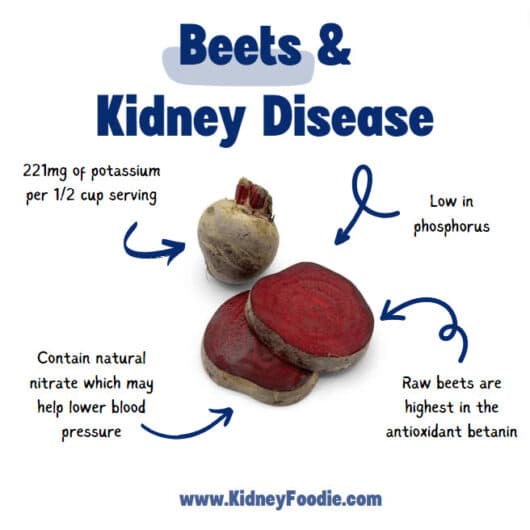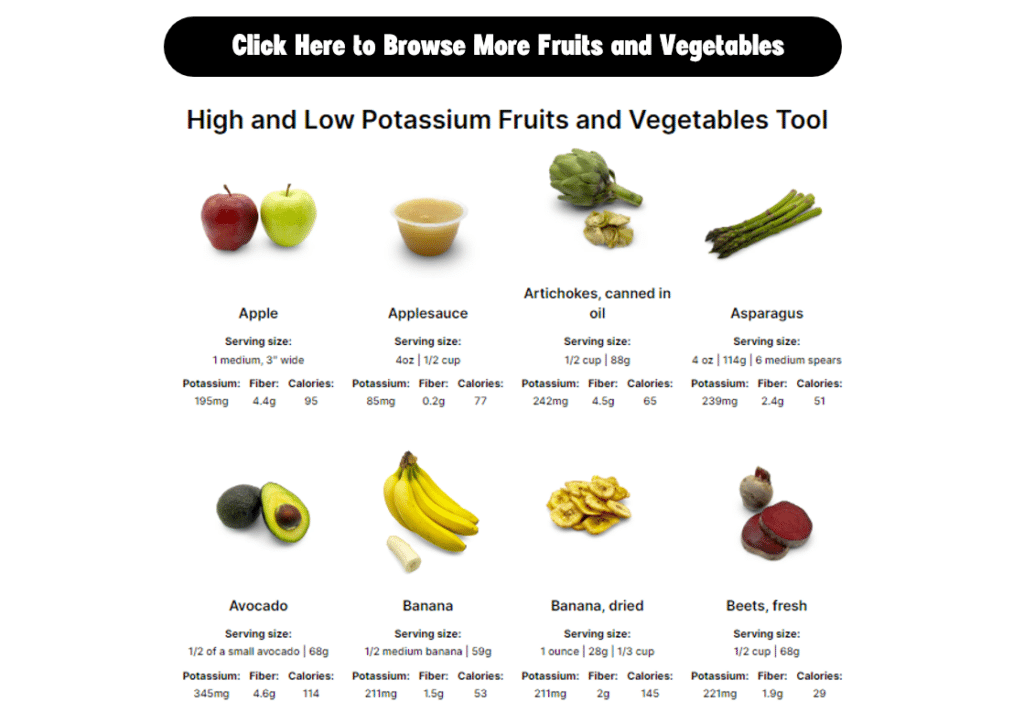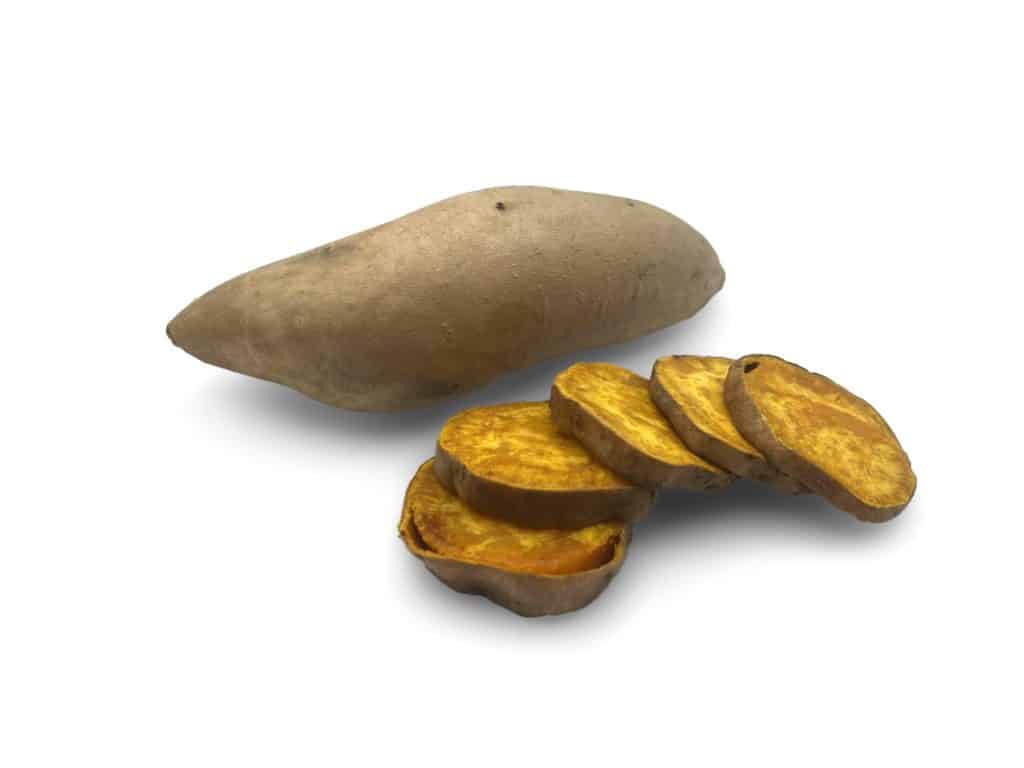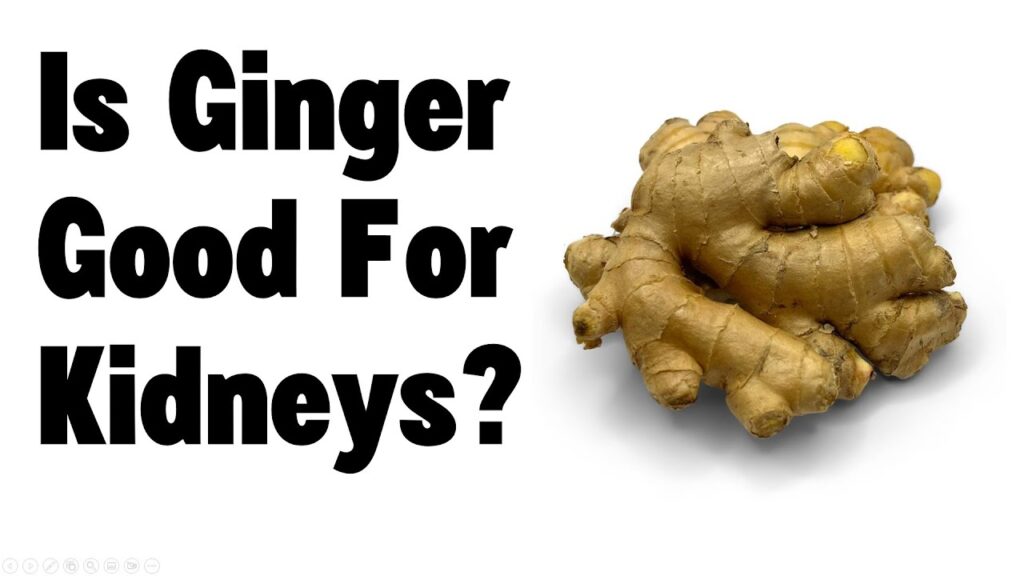Table of Contents
Are Beets good for kidneys?
Yes, beets are rich in antioxidants, fiber, and vitamins that are beneficial to people with kidney disease.
This post may contain affiliate links through which we may earn a small commission to help keep this website free.
Beets contain a number of biologically active phytonutrients including betains, betalains, polyphenols, flavonoids, vitamins, and nitrate.
Betanin, which is a type of betalain, is the primary antioxidant found in beetroot. Betanin can help reduce oxidative stress and some research has even found that it may have some antitumor properties.
Fresh red beets have the highest concentration of betanin compared to other forms of beets such as boiled beets, dried beets, pickled beets, beet juice, or beet puree.
Beets are also well known for containing dietary nitrate. Nitrates may help lower blood pressure by improving vasodilation of blood vessels, although the results can vary based on a variety of different factors such as your oral microbiome. Including beets in your diet is not a substitute for adhering to other blood pressure lowering strategies such as medication, diet changes, and exercise.
Additionally, while beets contain a number of beneficial compounds, it is important to understand that a well balanced kidney diet will contain a variety of fruits and vegetables. There is no single fruit or vegetable that should be prioritized over another or eaten in larger quantities.

Are beets high in potassium?
One half cup of fresh beets contain 221mg of potassium. Many kidney professionals consider a vegetable to be high in potassium if it contains more than 200mg of potassium, so beets are considered a high potassium vegetable.
If you have kidney disease, you should not restrict your intake of fruits and vegetables because of potassium content unless instructed by your kidney dietitian or healthcare provider. Many people who have kidney disease do not need to restrict their intake of potassium. There are many other factors that could cause you to have high potassium levels that are not related to the amount of potassium in your food.
For example, constipation can lead to higher potassium levels in people with chronic kidney disease. Getting in adequate fiber can help you manage your potassium better because it helps relieve constipation, so people with kidney disease are able to remove more potassium from their body with their bowel movements.
You can also learn more about managing potassium and kidney disease through our courses or by signing up for our complimentary newsletter.
Canned beets are lower in potassium. Canned, drained beets contain only 126mg of potassium per half cup serving, which makes them a lower potassium vegetable.
Canned fruits and vegetables are almost always lower in potassium than their fresh version. Be sure to drain off the liquid though, because it will contain a lot of the potassium.
Beet juice is considered a high potassium food. Beet juice can contain more than 500mg of potassium per cup. Many beet juices have been processed in a way that removes some of the beneficial nutrients. Beet juices are also very high in sugar. We typically recommend consuming fruits and vegetables in their whole form to ensure that your body gets all of the available nutrients.
Are beets high in phosphorus?
No. One half cup of beets contains about 27mg of phosphorus. The phosphorus found in beets is natural and poorly absorbed by the body, so it is considered a low phosphorus food.
For more information about phosphorus and kidney disease, check out our youtube video.
Is Beet juice bad for your kidneys?
Generally speaking, we do not recommend juices in a kidney friendly eating plan. Juices tend to be higher in sugar, more concentrated in potassium, and do not contain any fiber (which can sometimes worsen potassium levels).
Beet juice can contain more than 500mg of potassium per cup. We would also expect that beet juice would be high in oxalates.
Juice is typically easier to consume in larger quantities compared to fresh beets, so you would likely consume a much higher amount of potassium or oxalate by drinking juice.
Additionally, beet juice tends to be lower in the bioactive compounds such as betanin and flavonoid, and has lower antioxidant capacity compared to other forms of beets. If you are interested in the antioxidants found in beets, eating fresh beets will provide you with more antioxidants than beet juice.

Are pickled beets good for your kidneys?
Pickled beets are typically lower in potassium compared to fresh beets, but are higher in sodium and sugar. Pickled beets are also lower in antioxidants and flavonoids, so pickled beets may not have as many health benefits as fresh beets.
What are the benefits of beets?
- Beets contain several beneficial compounds. Beets have been associated with improved exercise performance, reduced oxidative stress, inhibiting cancer cell growth, and improving blood pressure.
- Beets are high in antioxidants, such as beta-carotene, lutein and zeaxanthin, which may protect against certain types of cancer and eye diseases. Betalain, which gives beets their red pigment, is one of the most potent antioxidants in beets.
- Beets contain dietary fiber, which aids digestion and promotes regular bowel movements. The fiber content helps prevent constipation and supports a healthy digestive system. Avoiding constipation is an important way of helping maintain good potassium levels.
- Research shows that a low intake of fruits and vegetables is associated with an increased risk of developing kidney failure in people with kidney disease (as well as those who don’t have kidney disease), so be sure to eat adequate fruits and vegetables each day.
Healthy ways to eat beets
- Roasted Beets: Preheat your oven to 400°F (200°C). Wash and peel the beets, then chop them into cubes or wedges. Toss the beets with a little olive oil, salt, and pepper. Spread them on a baking sheet and roast for about 30-40 minutes until tender. You can eat roasted beets as a side dish or add them to salads.
- Raw Beet Salad: Grate or julienne raw beets and toss them with fresh lemon juice, olive oil, salt, and your choice of herbs such as parsley or mint. You can also add other vegetables like carrots or cucumber to create a colorful and nutritious salad.
- Beet Smoothie: Blend cooked and cooled beets with your favorite fruits, such as berries or bananas, along with a liquid base like almond milk or coconut water. You can also add a handful of spinach or kale for an extra boost of greens.
- Beet Chips: Slice beets thinly using a mandoline or a sharp knife. Arrange the slices on a baking sheet, lightly coat them with olive oil, and sprinkle with salt and any desired seasonings. Bake at 325°F (160°C) for about 20-30 minutes until crispy. Beet chips make a healthier alternative to regular potato chips.
Are beets high in oxalates?
Beets are relatively high in oxalates. Beets contain approximately 59mg of soluble oxalate per 100g portion. (Source) If you are prone to calcium oxalate kidney stones, you should consider limiting your intake of beets.
Oxalates are naturally occurring compounds found in many foods. When consumed, oxalates can bind with calcium in the body to form crystals, which can contribute to the formation of kidney stones in some individuals.
Kidney stones are hard deposits that form in the kidneys when there are high levels of certain substances, such as calcium, oxalate, and uric acid, in the urine. The most common type of kidney stone is calcium oxalate stones, which are formed when calcium and oxalate combine in the urine.
While oxalates are present in many foods, not everyone who consumes oxalates will develop kidney stones. Factors such as individual susceptibility, overall diet, and lifestyle choices play a role in kidney stone formation.
The highest oxalate fruits and vegetables are spinach, rhubarb, and swiss chard. However, it’s important to note that the mere presence of oxalates in food does not guarantee kidney stone formation. If you are not prone to developing kidney stones, then there is no reason to avoid foods that are high in oxalate.
High and Low Potassium Fruit and Vegetable Tool
Looking for more information on other kidney friendly fruits and vegetables? Check out our Fruit and Vegetable Potassium Tool.



